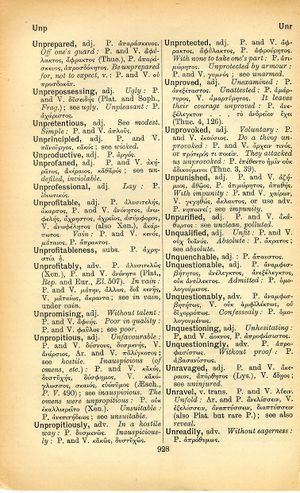unprovoked: Difference between revisions
From LSJ
Περὶ τοῦ ἐπέκεινα τοῦ νοῦ κατὰ μὲν νόησιν πολλὰ λέγεται, θεωρεῖται δὲ ἀνοησίᾳ κρείττονι νοήσεως → On the subject of that which is beyond intellect, many statements are made on the basis of intellection, but it may be immediately cognised only by means of a non-intellection superior to intellection
(CSV5) |
m (Woodhouse1 replacement) |
||
| Line 1: | Line 1: | ||
{{Woodhouse1 | {{Woodhouse1 | ||
|Text=[[File:woodhouse_928.jpg|thumb|link={{filepath:woodhouse_928.jpg}}]] | |Text=[[File:woodhouse_928.jpg|thumb|link={{filepath:woodhouse_928.jpg}}]] | ||
===adjective=== | |||
[[voluntary]]: [[prose|P.]] and [[verse|V.]] [[ἑκούσιος]]. | |||
[[do a thing unprovoked]]: [[prose|P.]] and [[verse|V.]] [[ἄρχειν τινός]], or [[πρότερός τι ποιεῖν]]. | |||
[[they attacked us unprovoked]]: [[prose|P.]] [[ἐπέθεντο ἡμῖν οὐκ ἀδικούμενοι]] ([[Thucydides|Thuc.]] 3, 39). | |||
}} | }} | ||
Revision as of 08:56, 20 May 2020
English > Greek (Woodhouse)
adjective
voluntary: P. and V. ἑκούσιος.
do a thing unprovoked: P. and V. ἄρχειν τινός, or πρότερός τι ποιεῖν.
they attacked us unprovoked: P. ἐπέθεντο ἡμῖν οὐκ ἀδικούμενοι (Thuc. 3, 39).

